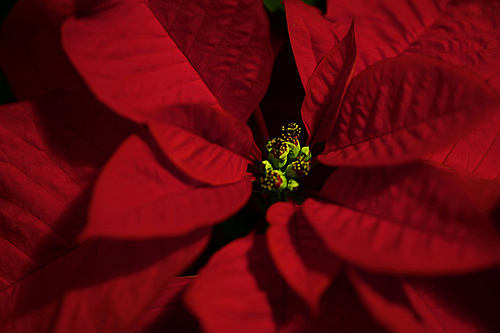
Photo by Southernpixel under the Creative Commons Attribution License 2.0.
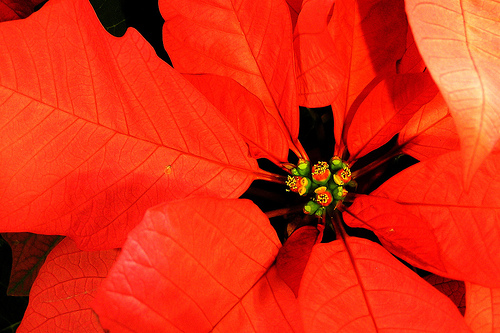
Photo by Muffet under the Creative Commons Attribution License 2.0.
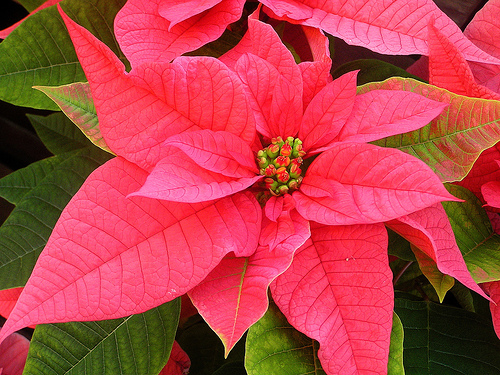
Photo by Muffet under the Creative Commons Attribution License 2.0.
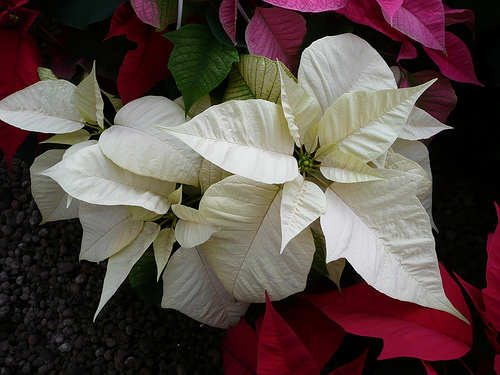
Photo by Pizzodiseveo under the Creative Commons Attribution License 2.0.
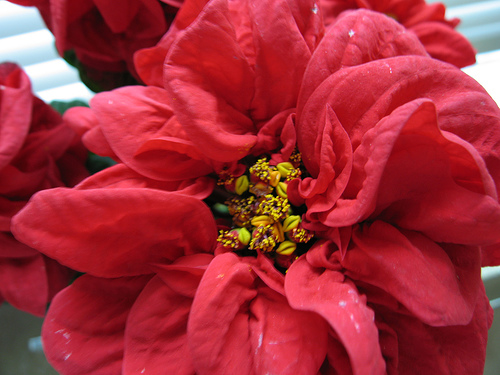
Photo by Miheco under the Creative Commons Attribution License 2.0.
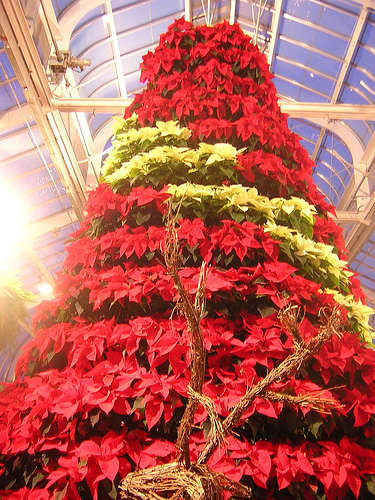
Photo by Revjim5000 under the Creative Commons Attribution License 2.0.
I’m a huge fan of the poinsettia (Euphorbia pulcherrima), and I enjoy choosing a new color or shape that the botanical breeders come up with every year. Even my Christmas dishes carry a lovely poinsettia pattern.
Let’s get right to it and dispel with the poisonous myth, shall we? In the early 1900s rumors began to circulate about the poinsettia’s supposedly darker side—some claimed the plant was poisonous if ingested. Then in 1919 the poinsettia’s fate was sealed when a story circulated that a two-year-old boy died after eating a poinsettia leaf.
The story was revealed as untrue, but the damage was done. Caring mothers would certainly never bring a death-plant willingly into their home. Although it is still seen as a holiday symbol, the poinsettia fell out of favor as far as home decoration. Still, some argued that the winter flower didn’t earn this ugly reputation that it had been saddled with.
In the 1970s, Ohio State University did a study for the Society of American Florists to come up with the toxic answer once and for all. The study proved that the poinsettia plant was, indeed, not poisonous. They further concluded that if a 50-pound child ate somewhere in the neighborhood of 500 leaves, they would maybe suffer an upset stomach. Poinsettias were officially off the toxic hook, as it were, but the public continued to resist.
To this day (thirty years later), I can’t tell you how often I hear people repeating the same untrue rumor, then passing these lovely winter ladies by because of an old wives’ tale. So I’m determined to do my part in hopes of encouraging people to bring poinsettias back into their homes without fear that they’ll kill the family dog—or worse.
Another interesting piece of poinsettia trivia is that it isn’t the brightly colored flowers that spruce up the holiday season. In fact, most people hardly notice the flowers at all. No, it’s the poinsettia’s bracts that have become the yuletide tradition. The bracts are beautiful leaves that are there to lure pollinators to the true yellow and green flowers in the center of the plant.
It’s these bracts that plant breeders fiddle with, giving us poinsettias with various shades of red, pink, white, cream, purple, light green, and even orange. They offer us bracts that are huge and open, some that are tangerine-sized, and others that are rose-shaped and wear dainty ruffles. The next time you find yourself staring at a beautiful display of festive poinsettias, you can bring one home and do so with a clear conscience.
*While poinsettias aren’t toxic, those individuals sensitive to latex could have a allergic skin reaction to the plant. A dog’s mouth could be irritated by the sap, as well—so if your dog tends to chew, consider this aspect.

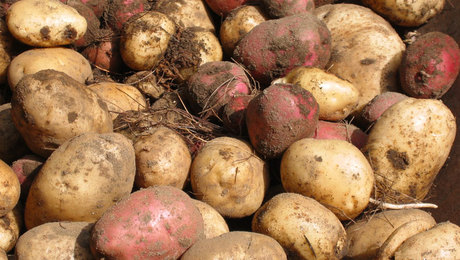



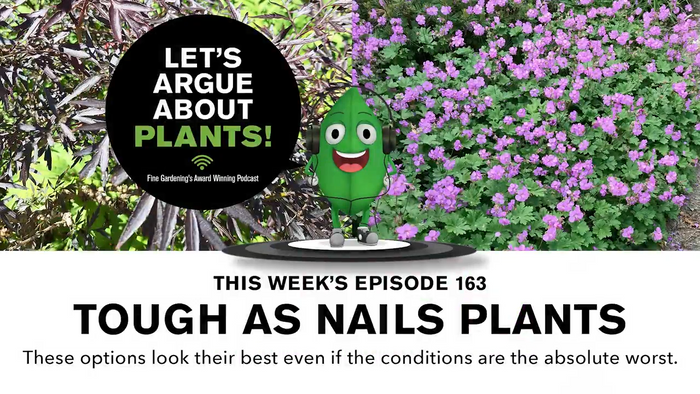
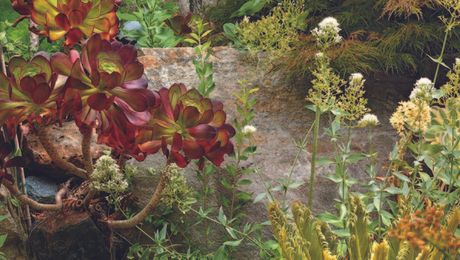
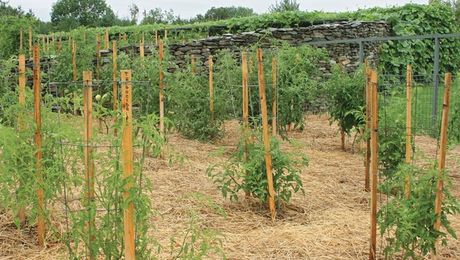









Comments
Words for the article: Regarding Chris McLaughlin, contributor, article trying to dispel the "old wives tale" of Poinsettia's not being deadly.
I am only referring to the claims regarding dogs. I do not know how correct it is regarding people
As far as her claims for dogs, here are a few words I associate with this article:
Incorrect
Dangerous
Ignorant
Irresponsible
Poor journalism
Liability for Fine Gardening
Let's go to the American Kennel Clubs official website. These articles are either written by, or reviewed and approved by some of the finest Veterinarians in the United States.
http://www.akc.org/public_education/holiday_safety.cfm Specifically states: "Holly, mistletoe and poinsettia plants are poisonous to dogs. Make sure they are kept in places your dog cannot reach."
Next...
http://www.akc.org/news/index.cfm?article_id=3390
Specifically States: "Consider using an artificial tree. Tree water and pine needles are harmful to dogs. Other holiday plants which are toxic to dogs are poinsettias, holly and mistletoe"
Next...
If you don't believe the AKC, how about another veterinarian run website: http://petcare.suite101.com/article.cfm/christmas_plants_toxic_to_pets Here the plant's toxic effects are in more detail:
"Poinsettia – The poinsettia is a popular and beautiful plant during the holiday season. These plants are usually not deadly when ingested. The plant has changed some through hybridization so the floral industry contends that these plants are not poisonous.
The poinsettia is listed as poisonous because the sap is an irritant. If any part of the plant is ingested by a dog, cat, rabbit, or other curious pet the animal may show signs of oral irritation by shaking its head, hyper-salivating, or pawing at the head and mouth. The plant my also cause vomiting.
Treatment – Wash the sap off immediately to stop further irritation. If the animal is vomiting or if the eyes appear inflamed then call your veterinarian. Medications may be needed to treat your pets eyes and/or to treat the GI tract."
So, take the EXPERTS advice and do not allow your dogs to come into contact and possibly ingest Poinsettia's.
Will Fine Gardening be paying for Vet bills and replacement costs of the pets that are sicken or killed with this flippant piece of poor writing.
John Zappulla
[email protected]
JohnZappula: From the UNL Extension Office - Horticulturist Dr. Jim Hruskoi
http://hort4.unl.edu/hort-tip/poinset2.htm
From the Ohio State University, who did thousands upon thousands of dollars of research to unveil the truth about the potential toxicity in poinsettias:
http://www.osu.edu/news/releases/98-12-15_Poinsettias_Are_Not_Toxic.html
There are research facilities all over trying to dispel of this myth. I do commend AKC for covering all of the bases considering the sap can be an irritant. If a dog's mouth get's too irritated, I guess it might not eat and that's another way it could die.
I wrote this article to help dispel the myth that if an animal or human ingests a poinsettia plant that it's fatal. It simply isn't.
There are many people who still hang on to the misconception and this could certainly be the case with the AKC. The AKC doesn't have links to any type of research that can back up this claim. Looks like they're being cautious and that's fine.
That said, I don't think anyone or anybody should be encouraged to eat any houseplant that hasn't been proven to be actual food. After all, an individual (or any pet) could have an allergy to some specific compound and die just from their own individual reaction.
Bees are a good example. People who are allergic to bee venom could die from a sting, but no one is saying not to have bees in your yard because they're toxic.
Certainly, if there is some contradicting research out there, I would be very interested to see it.
Not to mention that you're arguing that the sap could be an irritant - which is exactly what I stated in italics. I went ahead and added to my already italicized statement about the sap potentially irritating skin - that dog's mouths could react, as well in case that wasn't already clear for some people.
LOL
I recall during the 1950's, that 4 out of 5 Doctors recommended Lucky Strikes or was it Camel Cigarettes.
So your Doctor reference, Dr. Jim Hruskoi, are you a Doctor, PHD., or a MD?
Would you have recommended Lucky's?
My concern is that by advising the public to forget the risks and enjoy a rather bland plant, how many dogs have you sentenced to become ill, and perhaps die.
If you have a dog, why not do a test and feed it some leaves. Up to the test?
JohnZappulla: I have in italics about the possible *irritant*. Since even the expert vet that *you* quoted said that dogs won't die from this plant, I'm not sure why you keep bringing death into the equation. So far, all of the experts (including your source)agrees that it could irritate - not kill. I'm unclear as to what your real problem is here.
I am just curious - since you are insistent, do you have any links that show where a dog was shown to have definitively died or been severely hurt by poinsettias? Not some anecdote or unproven story....
As you may know, Snopes is a website that is devoted to researching urban myths. It's considered by many to be THE site for that, in fact. Here's their page which backs up this article.
http://www.snopes.com/holidays/christmas/poinsettia.asp
I'd be far more worried about something like a Diffenbachia or such than poinsettia.
Chris is absolutely right. The poinsettia causes gastrointestinal irritation, which can cause excess salivation and vomiting. It is NOT considered to be an extremely toxic plant. It's toxicity has been and continues to be overrated.
Chris is also right that Pet Care at Suite101.com is not a veterinarian-run website. However, I am the current Feature Writer for Pet Care at Suite101.com and I am a veterinarian, practicing veterinary medicine since 1986. (The article quoted was written by a contributing author, not by me and I have no control over other articles published there. That being said, I do not disagree with Ms. Dawson's article as she states, as does Chris, that the sap of the poinsettia is an irritant.) Feel free to research my credentials if you feel the need: Lorie Huston, licensed and practicing in Rhode Island. My license info is here: https://healthri.mylicense.com/Verification/Details.aspx?agency_id=1&license_id=111236&
Would I recommend feeding poinsettia plants to your dog or cat? Of course not! And I don't believe that Chris would either. That does not mean, however, that she is incorrect about the poinsettia as a toxic plant. At best, poinsettias should be thought of as mildly toxic. Perhaps not completely safe for our pets, but not likely to cause life-threatening toxicities in an otherwise healthy pet, either.
By the way, the poinsettia toxicity page for the ASPCA Poison Control Center is here: http://www.aspca.org/pet-care/poison-control/plants/poinsettia.html. It also states that poinsettia toxicity is over-rated.
I hope this helps to clarify the poinsettia toxicity debate for pet owners.
Here's the article we usually send out to our readers this time of year about poinsettias. Our technical editor wrote an article where she, too, states that they are not deadly, just mildly irritating. See the fourth paragraph:
https://www.finegardening.com/design/articles/holiday-poinsettia-care.aspx
See also this video Fine Gardening's editor posted in our forums about eating them:
http://forums.finegardening.com/over-fence/general-discussion/eating-pointsettia
Though I can't say I'll be running out to eat them anytime soon!
Wow, John, I'm not sure why you are so angry about this article, I found it quite helpful.
Fine Gardening, thanks for taking the time to wade into what is a hot button topic for John apparently. As for me, I loved it. Merry Christmas and keep the articles coming. John, go have a cup of tea.
I am 56 yrs. young and have been told this all my life...thanks for the info! I will definitely be passing it on!
Excelent article. I found very interesting that people would consider poinsettias toxic, let alone deadly! I'm originally from Mexico, from where this beautiful plant is native, and where it has been a symbol of Christmas, as well as popular holiday decoration, since the 16th century, and not once ever heard anyone refering as poinsettias (or nochebuenas as we know them) as toxic.
Poinsettias are highly appreciated in Mexico, and most mexicans are proud of the fact that the plant is indigenous to our country. This species has been known since the Pre-Columbian era, when the Aztecs used the plant to produce a red dye. So after centuries of having this plant in households, with kids and pets, if it was poisonous, I think it would be plenty of documented cases by now, which is not the case.
I'm also a pet lover, and proud pet parent of three dogs, whom I adore, and of course I'm always careful, but there's a difference between been careful and obsessive. I think John comments are exagerated, and out of the line. Seems like even in the pet world there's helicopter parents.
So again, thanks for the excelent article and for helping to clarify this misconception, by setting the record straight, hopefully that would help the beautiful poinsettias to break free from that bad reputation they didn't deserve.
John, what are you so angry about? Don't like to be wrong, huh? I found the article interesting and like all subjects, may research this further before I make up my mind...
Chris, thank you for an excellent article. I too have had the misconception of the poinsettia's toxicity for my entire life. Yet, we always had them in our home during the holidays as long as there were no "crawling babies" in attendance. The animals were never a concern because they always exhibited enough sense to avoid eating the plants and the poinsettias never appeared to tempt the animals to use them as an appetizer.
John must need a vacation. His inflammatory comments are the only thing toxic. How anyone could compare a poinsettia to smoking cigarettes is beyond rational comprehension. As Canadian Holly suggested he have a cup of tea, it is my hope he will make it a Chamomile tea.
Thank you, Chris, for the informative article.
Mary
Thank you Chris. I had heard the old wives tale but never thought much about it. John dosen't read what he wrote. In his last entry by Pet Care he said exactly the same thing you did about pets. He did however leave out the part about people and laytex. Dogs get into all kinds of things as do children and one never knows what made them sick exactly nor killed them unless a complete autopsy is performed. Indeed children and pets die from ingesting plants not necessarily because they are posonous plants but because the animal or human, as the case may be, it allergic to it. Thank you.
How timely is this! I just said to my neighbor, in my complete ignorance and error, that I couldn't take the poinsetia plant she received from the people who deliver her free food box monthly, at Christmas time. Well, I'm so happy now, I shall be able to take it; the worst happenstance in our house will be when/if our 3 cats knock it over on their daily dance around the ceiling at breakneck speeds!! Especially since, last year, even under my careful instructions, she managed to kill it with in 2 wks, aargh!??? I was going to give her some succulents in a pot for indoors, but thought better after that, planting them in ground in front of her apt, doing spectacularly, we're both so pleased!! I get ALL mine at triple W gosucculent dot com, note, not plural. Wait till you see their pictures, but I digress. Now we can have our poinsettias and enjoy them also! Thank you so much for dispelling eons of false testimony. And for anyone who no believe, copy/paste that Snopes address and check it out, they're the Sherlock Holmes of internet story debunkers! So many chain letters, one does need help! THANKS FOR SETTING US STRAIGHT, ONCE & FOR ALL! from Tucson, AZ
My dog Molly ate poinsetta on 12/22/2011 early morning. We took her to her vet when they opened 8 am. She died that evening around 6 pm. She had no other medical conditions, despite the vets trying to blame it on "some unknown, underlying condition". I wished I had never kept that poinsetta on our fireplace ledge within her reach. She is gone from our lives, and now the sight of poinsettas make me sick.
So...are they toxic for cats?
No. The sap *can* be a skin (and mouth) irritant, though, but the cats seem to quit as soon as they sap touches their tongue.
I have had cats all my life (I am 78) and they have nibbled poinsettia leaves and bracts every Christmas without so much as an upset stomach. Give it a rest.
Log in or create an account to post a comment.
Sign up Log in